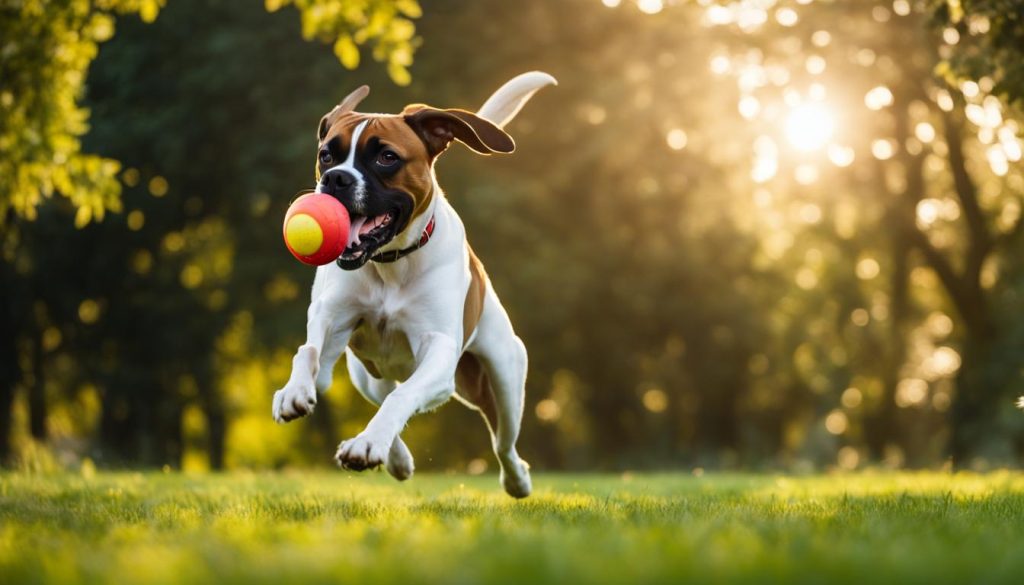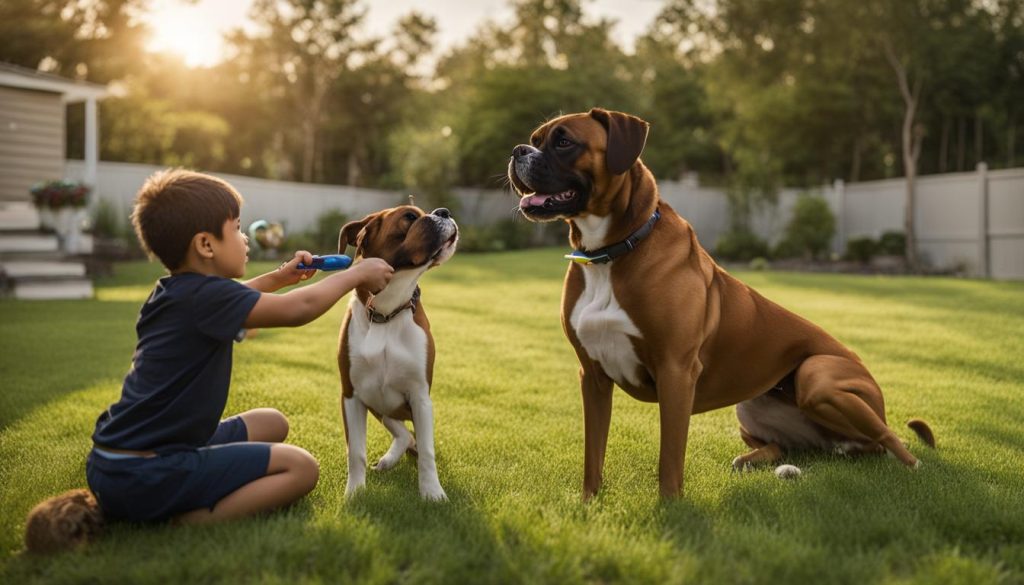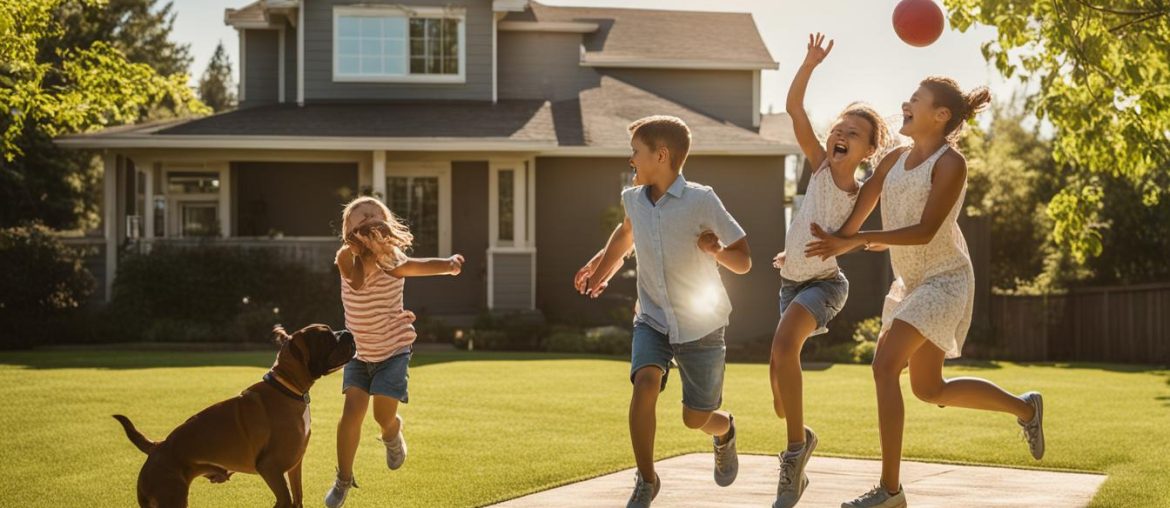Boxers are a popular choice for families looking for a furry companion. Their playful and gentle nature, coupled with their loyalty and protective instincts, make them well-suited for a family environment. But are Boxers really good family dogs? Let’s explore the truth about Boxers as family pets.
Boxers have a goofy and playful personality that kids are drawn to. They get along well with children, making them a great match for families. However, it’s important to ensure proper socialization and introduction between the Boxer and children. This breed requires exercise and outdoor playtime, making them ideal for active families.
Join me as we dive deeper into the temperament, requirements, training, and suitability of Boxers for families. Discover the truth about Boxers as family companions and gain valuable insights to help you make an informed decision for your family.
Key Takeaways:
- Boxers are known for their playful and gentle nature, making them great family dogs.
- Proper socialization and introduction between Boxers and children are important.
- Boxers require regular exercise and outdoor playtime, making them a good match for active families.
- Training is essential to channel their energy and exuberance in a positive way.
- Supervision is necessary to ensure safety between young children and Boxers.
Boxer Temperament for Families

When considering a Boxer as a family pet, it’s important to understand their temperament and how they interact with family members, especially children. Boxers are known for their family-friendly traits and make wonderful companions for households with kids.
One of the key characteristics of Boxers is their playful and fun-loving nature. They have a natural affinity for children and are often drawn to their energy and enthusiasm. Boxers have a goofy and silly side that kids find irresistible, making them excellent playmates.
Additionally, Boxers are known for their loyalty and protective instincts towards their family members. They are highly devoted and will go to great lengths to defend and protect their loved ones if necessary. This makes them a reliable and trustworthy breed to have around children.
| Boxer Family-Friendly Traits |
|---|
| Playful and goofy nature |
| Loyal and protective |
| Patient and gentle with children |
| Excellent playmates for kids |
“Boxers have a natural affinity for children and are often drawn to their energy and enthusiasm. They have a goofy and silly side that kids find irresistible, making them excellent playmates.”
Socialization and Training
While Boxers have a generally family-friendly temperament, it’s important to provide them with proper socialization and training from an early age. This helps them learn appropriate behavior and interactions with children and other family members.
Boxers are intelligent dogs and thrive with positive reinforcement training methods. By using rewards and praise, you can teach them good manners and reinforce the desired behaviors. Obedience training is also recommended to establish a strong bond and ensure that the Boxer understands their role within the family unit.
To summarize, Boxers possess a temperament well-suited for families. They are playful, loyal, and protective, making them excellent companions for both children and adults. With proper socialization, training, and love, Boxers can thrive in a family setting and bring joy and happiness to all members.
Boxer Requirements for Families

When considering a Boxer as a family dog, it’s important to understand their specific requirements to ensure a harmonious and happy relationship. Here are some key aspects to consider:
Sufficient Exercise and Playtime
Boxers are an energetic breed that requires regular exercise to keep them physically and mentally stimulated. Daily walks, runs, or playtime in a secure area are essential to release their energy and prevent destructive behaviors. Engaging in activities such as playing fetch or participating in dog sports can also provide mental stimulation and strengthen the bond between the Boxer and the family.
Consistent Training and Socialization
Training is crucial for Boxers to learn good manners and behaviors. They are intelligent dogs that respond well to positive reinforcement techniques. Consistency and patience are key when teaching them commands and house rules. Additionally, early socialization with people and other animals is vital to ensure that Boxers grow up to be well-rounded and confident companions.
Avoiding Extended Alone Time
Boxers thrive on social interaction and can become anxious or bored when left alone for long periods. They are a breed that craves companionship and may develop undesirable behaviors if they feel lonely or neglected. It’s important for families considering a Boxer to ensure that someone will be available to spend time with the dog or arrange for appropriate doggy daycare or a pet sitter when necessary.
Providing Mental Stimulation
In addition to physical exercise, Boxers also benefit from mental stimulation. Interactive toys, puzzle feeders, and training sessions that challenge their problem-solving abilities can help keep their minds engaged and prevent boredom. This can result in a happier and more content Boxer who is less likely to engage in destructive behaviors.
| Boxer Requirements | Description |
|---|---|
| Exercise | Regular physical activity to release energy and prevent destructive behaviors. |
| Training | Consistent and positive reinforcement training to learn good behaviors and obedience. |
| Socialization | Early and ongoing socialization with people and other animals to ensure a well-rounded companion. |
| Companionship | Avoiding extended periods of alone time and providing social interaction to prevent loneliness and boredom. |
| Mental Stimulation | Engaging activities and toys that challenge their problem-solving abilities to keep their minds engaged. |
By meeting these requirements, families can provide a fulfilling and enriching environment for their Boxer, ultimately strengthening the bond and creating a loving and harmonious relationship.
Boxer’s Suitability for Families with Children
Many families wonder if Boxers are suitable dogs for households with small children. Contrary to popular belief, Boxers possess a patient and gentle nature, making them excellent companions for kids. The American Kennel Club recognizes Boxers as a popular choice for families and describes them as “patient and spirited with children.”
However, it’s important to supervise interactions between young children and Boxers due to the breed’s size and energy levels. Boxers can be exuberant and may unintentionally knock over small children during play. Therefore, close supervision and teaching children how to interact respectfully with dogs are essential to ensure the safety of both the children and the Boxer.
With proper socialization and training, Boxers can form strong bonds with children and become their protective playmates. Boxers have a natural instinct to defend their family if necessary, which can provide an added sense of security for parents. Moreover, their playful and goofy personality makes them a source of endless fun and laughter for kids.
| Boxers and Small Children | Boxers as Family Dogs | Boxers and Child-friendliness |
|---|---|---|
| Boxers possess a patient and gentle nature | Boxers are recognized as a popular choice for families | Boxers are described as “patient and spirited with children” by the American Kennel Club |
| Supervision and teaching children how to interact respectfully with dogs are important | Boxers can form strong bonds with children and become their protective playmates | Boxers have a natural instinct to defend their family |
| Proper socialization and training are essential | Boxers can provide an added sense of security for parents | The playful and goofy nature of Boxers brings endless fun and laughter to kids |
Boxer Training for Families
Training is an essential aspect of welcoming a Boxer into your family. With their intelligence and ability to learn quickly, Boxers respond well to positive reinforcement and rewards. It is important to avoid punishment, as it can lead to aggressive behavior in this breed. Obedience training is highly recommended to establish a strong bond and ensure that your Boxer understands what is expected of them.
When training your Boxer, consistency is key. Start with basic commands such as sit, stay, and come, and gradually progress to more advanced training. Use treats or verbal praise as rewards for good behavior. It is also beneficial to enroll your Boxer in a formal obedience training class, where they can socialize with other dogs and learn from professional trainers.
Training Techniques
- Positive reinforcement: Reward good behavior with treats, verbal praise, or playtime.
- Clicker training: Use a clicker to mark desired behaviors and follow it with a reward.
- Consistency: Be consistent with your commands and expectations to avoid confusion.
- Patience: Training takes time and effort, so be patient and understanding with your Boxer.
“Training is an essential aspect of welcoming a Boxer into your family. With their intelligence and ability to learn quickly, Boxers respond well to positive reinforcement and rewards.”
Remember that Boxers are energetic and require mental stimulation, so incorporating interactive games and puzzle toys into their training routine can help keep them engaged. A well-trained Boxer is a happy and well-adjusted family member, ready to participate in various activities with their loved ones.
| Training Tips | Results |
|---|---|
| Consistency | Clear understanding of commands |
| Positive reinforcement | Motivated and responsive behavior |
| Clicker training | Effective communication and faster learning |
| Patience | Improved bonding and trust |
Boxer Exercise and Playtime for Families

When it comes to exercise and playtime, Boxers are an energetic breed that thrives on physical activity. They require regular exercise to keep them physically fit and mentally stimulated. Boxers are known for their love of outdoor play and enjoy activities such as running, chasing balls, and playing fetch. Their active nature makes them an excellent fit for families who enjoy spending time outdoors.
One of the best ways to provide exercise for Boxers is to engage in daily walks or jogs. This not only helps them burn off excess energy but also allows them to explore their surroundings and satisfy their natural curiosity. Additionally, Boxers love interactive playtime with their family members. Whether it’s a game of tug-of-war, hide-and-seek, or agility training, these activities create a strong bond between the Boxer and their human companions.
Outdoor Play Ideas for Boxers:
- Visits to the dog park: Boxers are social dogs, and interacting with other dogs can be a great way for them to burn off energy and practice their social skills.
- Hiking or trail walks: These activities provide both physical exercise and mental stimulation for Boxers as they explore new scents and environments.
- Playing in a fenced yard: Boxers love to run and play freely in a safe and secure outdoor space. This allows them to engage in uninhibited play and satisfy their need for physical activity.
Remember that Boxers have a high energy level, so it’s important to provide them with regular exercise to prevent boredom and potential destructive behaviors. By incorporating outdoor play and exercise into your daily routine, you can ensure that your Boxer remains a happy and active family companion.
Boxer Grooming and Care for Families

Grooming and care are essential aspects of keeping a Boxer healthy and happy in a family setting. While Boxers have a short coat that requires minimal grooming, regular brushing helps control shedding, especially during shedding seasons. This not only keeps your home clean but also helps maintain the coat’s overall health and shine. It is recommended to use a bristle brush or a grooming mitt to remove loose hairs gently.
In addition to grooming, providing proper care for your Boxer includes ensuring a balanced diet with high-quality dog food suitable for their specific dietary needs. Consult with your veterinarian to determine the best feeding schedule and portion sizes for your Boxer based on their age, weight, and activity level. Clean and fresh water should always be available to keep your Boxer hydrated throughout the day.
Regular veterinary check-ups are crucial for the health and well-being of your Boxer. Remember to schedule routine vaccinations, as recommended by your veterinarian, to protect your Boxer from common infectious diseases. Routine check-ups also allow for early detection of any potential health issues and prompt treatment if necessary.
Grooming Tips for Boxers:
- Brush your Boxer’s coat at least once a week to control shedding.
- Regularly check and clean their ears to prevent infections.
- Trim their nails regularly to maintain proper foot health.
- Brush their teeth regularly using dog-friendly toothpaste to prevent dental issues.
Caring for Your Boxer’s Hygiene:
- Bathe your Boxer as needed to keep their coat clean and free of dirt.
- Use a gentle dog shampoo to avoid skin dryness or irritation.
- Wipe their face regularly to prevent tear stains and keep their facial folds clean.
- Keep their living area clean and free from debris to ensure a hygienic environment.
| Grooming Needs | Level |
|---|---|
| Coat Length | Short |
| Coat Maintenance | Low |
| Shedding | Moderate |
| Brushing Frequency | Weekly |
| Bathing Frequency | As needed |
Boxer Health Considerations for Families

When considering Boxers as family pets, it’s important to be aware of their health considerations. While Boxers are generally healthy dogs, they are prone to certain genetic conditions that potential owners should be mindful of. Responsible breeding and regular veterinary care can help minimize the risk of these health issues and ensure the well-being of your Boxer.
Common Health Issues in Boxers
- Boxers are prone to certain cardiac conditions, including arrhythmogenic right ventricular cardiomyopathy (ARVC) and aortic stenosis.
- They can also suffer from orthopedic issues such as hip and elbow dysplasia, which can affect their mobility and overall quality of life.
- Boxers are at a higher risk for certain types of cancer, including mast cell tumors and lymphoma.
- Hypothyroidism is another health concern in Boxers, which can lead to weight gain, lethargy, and skin issues.
- Allergies are relatively common in Boxers and may manifest as skin irritations, respiratory issues, or gastrointestinal problems.
It’s crucial to work with a reputable breeder who conducts health screenings and genetic testing on their breeding stock to minimize the risk of these health issues. Choosing a Boxer from a responsible breeder can significantly reduce the chances of inheriting genetic conditions.
Proper veterinary care is essential in maintaining the overall health and well-being of your Boxer. Regular check-ups, vaccinations, and preventive measures such as heartworm and flea prevention are crucial in keeping your Boxer healthy and free from common parasites and diseases.
Responsible Breeding for Boxers
Responsible breeding practices play a vital role in producing healthy Boxers. A reputable breeder will prioritize the health and well-being of their dogs over profit. They will conduct health screenings, genetic testing, and evaluate the overall health and temperament of their breeding stock. Responsible breeders also provide proper socialization and early care for their puppies, ensuring they grow up to be well-adjusted and healthy members of a family.
| Health Condition | Prevention and Treatment |
|---|---|
| Cardiac conditions (ARVC, aortic stenosis) | Regular cardiac evaluations and screenings. Treatment varies depending on the severity of the condition. |
| Hip and elbow dysplasia | Orthopedic evaluations, X-rays, and proper nutrition. Treatment may include medication, physical therapy, or surgical interventions. |
| Cancer (mast cell tumors, lymphoma) | Regular check-ups, cancer screenings, and prompt treatment if any masses or abnormalities are detected. |
| Hypothyroidism | Thyroid hormone replacement therapy and regular monitoring of thyroid levels. |
| Allergies | Identification of triggers, avoiding allergens, and symptomatic treatment. |
By choosing a Boxer from a responsible breeder who prioritizes health, you can minimize the risk of inherited health conditions and provide a solid foundation for a healthy and happy Boxer in your family.
Boxer as a Family Companion – Celebrity Boxer Parents

Boxers have a rich history as beloved family companions, and their popularity extends beyond everyday households. Many well-known celebrities have also experienced the joys of owning a Boxer. These famous figures have recognized the Boxer’s unique qualities and their suitability as family dogs.
One notable celebrity Boxer parent is Kim Kardashian. She has owned several Boxers and has often shared adorable pictures and stories of her furry companions on social media. Kim Kardashian’s love for Boxers highlights their status as family-friendly dogs.
Another celebrity who loved Boxers was the late Luke Perry. The actor, known for his role in “Beverly Hills, 90210,” was a proud Boxer owner. He cherished his Boxer and spoke highly of the breed’s loyalty and affectionate nature.
The Boxer’s popularity as a breed is not limited to celebrity ownership. They consistently rank among the top 10 most popular breeds in the United States. This recognition is a testament to the Boxer’s appeal as a family companion.
Boxers have a long-standing reputation as dependable and loving family dogs. Their playful, protective, and loyal nature makes them excellent companions for households of all sizes. Whether in the homes of celebrities or everyday families, Boxers continue to bring joy and happiness as cherished family members.
Wrapping Up
To summarize, Boxers are undeniably good family dogs and make excellent pets for families. With their playful and gentle temperament, they are a delight to have around children. Boxers have a natural affinity for kids and their goofy personality makes them a popular choice for families seeking a fun-loving companion.
However, it’s important to remember that Boxers require proper training, socialization, and exercise to thrive in a family setting. By providing them with the necessary care and attention, they can become well-behaved and happy members of the family.
Overall, Boxers are family-friendly dogs that bring immense joy and love to any household. Their loyalty and protective instincts make them trustworthy companions, while their playful nature ensures endless hours of fun for both children and adults. If you are considering adding a new furry member to your family, Boxers are definitely worth considering.
FAQ
Are Boxers good family dogs?
Yes, Boxers are known for their playful and gentle nature, making them great companions for families.
What is the temperament of Boxers for families?
Boxers have a bright and fun-loving temperament. They are intelligent, protective, and patient with children.
What are the requirements for owning a Boxer as a family pet?
Boxers require regular exercise, consistent training, and social interaction. They thrive in active and loving family environments.
Can Boxers be suitable for families with small children?
Yes, Boxers are known for their patience and gentleness with kids. However, supervision is important due to their size and energy levels.
What kind of training do Boxers need in a family setting?
Boxers benefit from early socialization and obedience training using positive reinforcement techniques.
How much exercise and playtime do Boxers need in a family?
Boxers have a high energy level and require regular exercise and outdoor playtime to stay happy and healthy.
What is the grooming and care routine for Boxers in a family?
Boxers have a short coat that requires minimal grooming. Regular brushing can help control shedding.
What health considerations should families be aware of for Boxers?
Boxers, like any breed, may be susceptible to certain health conditions. Responsible breeding and regular veterinary care are important.
Have any celebrities owned Boxers as family pets?
Yes, Boxers have been owned by many well-known individuals, such as Kim Kardashian and Luke Perry.






